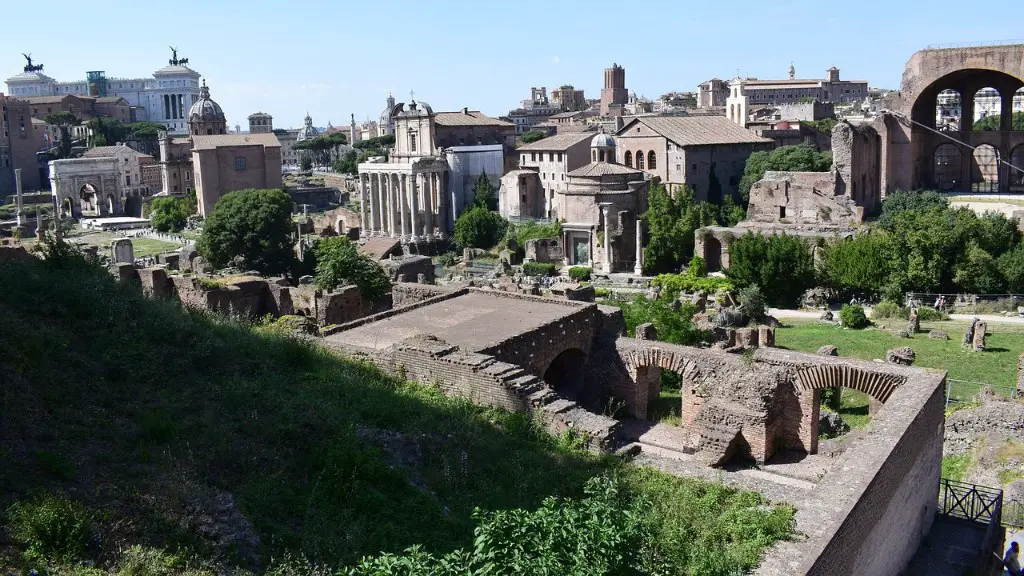If you were an outsider in ancient Rome, you would have been treated very differently depending on who you were and where you came from. If you were a foreigner from a nearby land, you might have been welcomed as a guest or even given citizenship. But if you were a enemy conqueror, you would have been treated much differently. The ancient Romans were known for their hospitality, but they could also be very cruel to their enemies.
The ancient Romans were typically quite tolerant of outsiders, provided that those outsiders were willing to integrate themselves into Roman society. The Roman writer Livy noted that the Romans were particularly tolerant of those who came to them seeking asylum, feeling that it was their duty to protect the oppressed. Roman law also generally treated foreigners fairly, although there were some exceptions (such as the fact that slaves were not afforded the same legal protections as Roman citizens). In general, then, the ancient Romans tended to be quite tolerant of outsiders, as long as those outsiders were willing to assimilate.
How did Romans view outsiders?
It is clear that many Romans at the time were quite xenophobic and did not want Rome to grant citizenship to any more foreigners. This was likely due to the fact that they felt that it would water down Roman culture and values. Additionally, they may have also been concerned about increased competition for jobs and resources.
Despite not being a citizen, an immigrant to the fourth-century empire could still go anywhere and work any craft they desired. There were many different aspects to each of Rome’s territories that made them unique and appealing to people. From the climate to the food to the types of careers available, there was something for everyone in the empire.
How were immigrants treated in ancient Rome
The early fifth century was a time of great anxiety for the Roman Empire. Cities were shaken by instances of xenophobia, with each one worse than the last. Immigrants were turned away when they asked for food, family members were kidnapped and beaten on the road, and an immigrant house of worship was set on fire. These events caused great fear and division among the people of the empire.
The Roman approach to conquered lands and peoples was unique in the ancient world. Rather than ruling them as conquered subjects, the Romans invited them to become citizens. This made them a part of Rome, rather than enemies fighting against it. The Roman system of law and citizenship was thus a key factor in the success of the Roman Empire.
What did Romans call outsiders?
The term “barbarus” was used by the Romans to refer to uncivilized people, in contrast to Greeks or Romans. In fact, after the age of Augustus, it became a common term to refer to all foreigners among Romans, including Germanic peoples, Persians, Gauls, Phoenicians, and others.
The Huns were a group of people who lived in Central Asia and invaded the Roman Empire in the 5th century. They were known for their superior fighting skills and caused thousands of people to flee west.
How did Rome deal with homeless people?
The homeless population in Rome was very large and they slept in various places around the city. Some slept under the stairs of insulae, which were apartment blocks that could be up to 70 feet tall. Others slept between the columns of porticoes or along the Tiber River. Augustus, the first emperor of Rome, decreed that the maximum height for buildings was 70 feet in order to try and reduce the number of homeless people.
Peregrinus simply means foreigner in Latin. during the Roman Republic, any person who did not have full Roman citizenship was considered a foreigner. This includes people who were under Roman rule but didn’t have citizenship.
How did the Romans treat people from other religions
The Romans were very tolerant of other religions, provided that the conquered populace incorporated the Imperial Cult into their own worship. The Romans sought to equate their own gods with those of the local population. This way, they could more easily control the conquered populace.
The Roman Empire was one of the most successful empires in history. In large part, this was due to their policy of treating conquered nations as allies rather than enemies. This encouraged those nations to take part in the glory and wealth of building the empire, rather than resisting and being punished. This was a key factor in the long-term success of the Roman Empire.
How were poor people treated in Rome?
The poor people generally had to work as unskilled workers, getting themselves hired on a daily basis to perform a variety of menial jobs. They were known as a mercenarius—the modern equivalent word being ‘mercenary’—meaning a person who works for money. They were often exploit by their employers and not given proper wages or working conditions. as a result, they were always living in poverty and insecurity.
The Roman Republic was founded in 509 BCE after the city of Rome was sacked by the Gauls. The Roman Republic lasted until the end of the Roman Empire in 476 CE. The Roman Republic was a republic, which means that one man could not rule the country. The Roman Republic was divided into two groups: the patricians and the plebeians. The patricians were the wealthier group of people while the plebeians were the poorer group of people. The patricians had more power than the plebeians. The Roman Republic was replaced by the Roman Empire after Julius Caesar was assassinated in 44 BCE. The Roman Empire was ruled by an emperor. The emperor had absolute power. The Roman Empire was divided into two groups: the senatorial class and the equestrian class. The senatorial class was the wealthier group of people while the equestrian class was the poorer group of people. The emperor granted the senatorial class more power than the equestrian class.
How did Romans treat female slaves
Women in ancient Greece had some legal and social rights, but they were not equal to men. They could be honoured for being priestesses or family members, but they did not have the same rights as men. Slaves, by contrast, had no legal or social standing at all and could be treated as beasts of burden by their masters.
In the Roman Empire, stealing could be punishable by death. However, if the thief was not killed when caught in the act, he could instead be sentenced to reimburse the victim, often four or five times the value of the stolen goods. This allowed for a more lenient punishment for those who were caught stealing, but also ensured that the victim was compensated for their loss.
Why did the Romans mistreat the Christians?
Christianity began to spread throughout the Roman Empire in the first few centuries AD. As the religion began to grow in popularity, the Roman authorities became increasingly concerned about its potential to disrupt social order. This led to periodic persecution of Christians, particularly during times of political unrest.
Although Christians were sometimes persecuted for their refusal to worship the emperor, this was not the only reason why they were disliked by the Roman authorities. Christians were also seen as a potential threat because they refused to worship the Roman gods or take part in sacrifice, which was expected of all citizens of the empire. This made Christians appear to be unpatriotic and caused them to be regarded with suspicion by many Romans.
These policies had served the empire well for centuries. However, they were forced to surrender their weapons, renounce their loyalty to their tribal leaders, and commit a certain number of fighting men to the Roman legions. This caused great unrest among the people and eventually led to the decline of the Roman Empire.
How did Romans name their slaves
Roman society was heavily reliant on slaves. Often they were prisoners of war, or the children of slaves, born in captivity. It was usual for a slave to have only one name, eg. Felix or Melissa. If a male slave was given his freedom, he became a libertus (freedman), while a female slave became a liberta (freedwoman).
The patricians were the wealthy upper class people in the early Roman Empire. Everyone else was considered a plebeian. Only certain families were part of the patrician class and you had to be born into one of those families to be a patrician. The patricians held all the power in the government and society.
Conclusion
The ancient Romans were very tolerant of different cultures and religions. They allowed people from all over the world to settle in Rome, and many of the great Roman leaders were from outside Rome.
The ancient Romans were not particularly welcoming to outsiders, and often regarded them with suspicion and mistrust. This was especially true of those who came from beyond the empire’s borders, and who were seen as a potential threat to Rome’s security and stability. Ancient Romans typically treated these outsiders with suspicion and hostility, and it was not uncommon for them to be subjected to violence and mistreatment.





